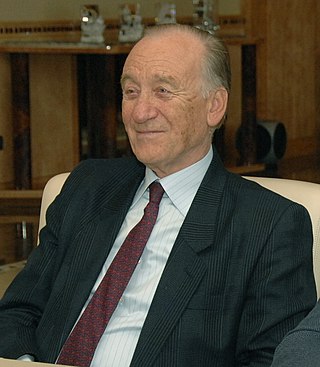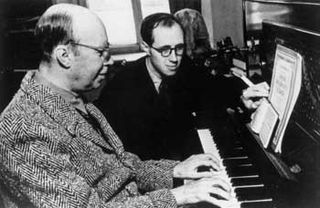Sources
- Liner notes by Andrew Huth to DG recording of the Cello Concertino
| Operas | |||||
|---|---|---|---|---|---|
| Ballets | |||||
| Symphonies | |||||
| Concertos |
| ||||
| Orchestral works | |||||
| Film music | |||||
| Vocal music | |||||
| Chamber music | |||||
| Piano music |
| ||||
| Related articles | |||||
Sergei Prokofiev's Cello Concertino in G minor, Op. 132 was left incomplete at the composer's death in 1953. It was completed by Mstislav Rostropovich and Dmitry Kabalevsky.
Prokofiev had been impressed by Mstislav Rostropovich, after working with him for his Symphony-Concerto, so he undertook to write a number of other cello pieces for him. The Cello Concertino was such a piece, intended to be of a light nature.
Prokofiev's death in 1953 left the work unfinished, the finale in particular. However, the composer had indicated to Rostropovich what his intentions were, so he undertook to complete it. Dmitry Kabalevsky orchestrated the piece.
The concertino is approximately 19 minutes in duration.

Sergei Sergeyevich Prokofiev was a Russian composer, pianist, and conductor who later worked in the Soviet Union. As the creator of acknowledged masterpieces across numerous music genres, he is regarded as one of the major composers of the 20th century. His works include such widely heard pieces as the March from The Love for Three Oranges, the suite Lieutenant Kijé, the ballet Romeo and Juliet—from which "Dance of the Knights" is taken—and Peter and the Wolf. Of the established forms and genres in which he worked, he created—excluding juvenilia—seven completed operas, seven symphonies, eight ballets, five piano concertos, two violin concertos, a cello concerto, a symphony-concerto for cello and orchestra, and nine completed piano sonatas.

Mstislav Leopoldovich Rostropovich was a Russian cellist and conductor. In addition to his interpretations and technique, he was well known for both inspiring and commissioning new works, which enlarged the cello repertoire more than any cellist before or since. He inspired and premiered over 100 pieces, forming long-standing friendships and artistic partnerships with composers including Dmitri Shostakovich, Sergei Prokofiev, Henri Dutilleux, Witold Lutosławski, Olivier Messiaen, Luciano Berio, Krzysztof Penderecki, Alfred Schnittke, Norbert Moret, Andreas Makris, Leonard Bernstein, Aram Khachaturian, and Benjamin Britten.

Daniil Borisovich Shafran was a Soviet Russian cellist.
The Cello Concerto No. 1 in E-flat major, Op. 107, was composed in 1959 by Dmitri Shostakovich. Shostakovich wrote the work for his friend Mstislav Rostropovich, who committed it to memory in four days. He premiered it on October 4, 1959, at the Large Hall of the Leningrad Conservatory with the Leningrad Philharmonic Orchestra conducted by Yevgeny Mravinsky. The first recording was made in two days following the premiere by Rostropovich and the Moscow Philharmonic Orchestra conducted by Aleksandr Gauk.

Rodion Konstantinovich Shchedrin is a Soviet and Russian composer and pianist, winner of USSR State Prize (1972), the Lenin Prize (1984), and the State Prize of the Russian Federation (1992), and is a former member of the Inter-regional Deputies Group (1989–1991). He is also a citizen of Lithuania and Spain.
Sergei Prokofiev's Symphony-Concerto in E minor, Op. 125 is a large-scale work for cello and orchestra.

Nikolai Yakovlevich Myaskovsky, was a Russian and Soviet composer. He is sometimes referred to as the "Father of the Soviet Symphony". Myaskovsky was awarded the Stalin Prize five times.

David Geringas is a Lithuanian cellist and conductor who studied under Mstislav Rostropovich. In 1970 he won the gold medal at the International Tchaikovsky Competition. He also plays the baryton, a rare instrument associated with music of Joseph Haydn.
Sergei Prokofiev's Symphony No. 7 in C-sharp minor, Op. 131, was completed in 1952, the year before his death. It is his last symphony.
The Symphony for Cello and Orchestra or Cello Symphony, Op. 68, was written in 1963 by the British composer Benjamin Britten. He dedicated the work to Mstislav Rostropovich, who gave the work its premiere in Moscow with the composer and the Moscow Philharmonic Orchestra on 12 March 1964. The work's title reflects the music's more even balance between soloist and orchestra than in the traditional concerto format.
Cello Concerto in E minor, Op. 58 is a concerto written by Sergey Prokofiev between 1933 and 1938. Its duration is approximately 35 minutes. It consists of three movements:
Nikolai Myaskovsky composed his Cello Concerto in C minor, Op. 66, during the years 1944–45. It ranks among the few works of the composer that are found frequently in concert or on recordings.
Isaac Iosifovich Mikhnovsky was a prominent Soviet pianist, composer, professor, and winner of the First All-Soviet Piano Competition. Apart from his highly successful performing and teaching careers, composing was also a significant part of his multi-faceted musical life. The catalogue of his works includes numerous piano transcriptions of Romances and Operatic Fantasies on melodies of Russian composers, and also a significant number of original piano, vocal, and chamber compositions.
The Cello Sonata, Op. 65, is a work by the English composer Benjamin Britten. It was premiered in July 1961 at the Aldeburgh Festival in Suffolk. The work is in five movements:

Dmitry Borisovich Kabalevsky was a Soviet composer, conductor, pianist and pedagogue of Russian gentry descent.

The Cello Sonata in C major, Op. 119, was composed by Sergei Prokofiev in 1949. The year before, Prokofiev was accused of formalism by the Zhdanov Decree and much of his music was banned. However, he continued to compose music, though he was not sure if his new works would ever be performed in public.

Sergei Prokofiev began composing his Sonata for Solo Cello, Op. 134, in 1952. The sonata was intended to be written in four movements, but as it was one of seven compositions which the composer was writing during this time, only the beginning of the first movement was completed before Prokofiev's death in March 1953.
Dmitri Kabalevsky composed two cello concertos. He is primarily a pianist and composer for piano. Kabalevsky has a career as a music educator, composer and member of the International Society for Music Education (ISME). Kabalevsky's works have been regarded unfavorably by many because of his associations and allegiance with the Communist Party and is referred to by some as a "Soviet Composer", who was "self-serving, sly, and opportunistic to the extreme." However, his compositions including the two cello concertos are used by various students around the world to learn technique.
The Cello Concerto is a composition for cello and orchestra by the composer Andrzej Panufnik. The work was commissioned by the London Symphony Orchestra for the cellist Mstislav Rostropovich. Its world premiere was performed by Rostropovich and the London Symphony Orchestra under the baton of Hugh Wolff on 24 June 1992. The concerto was Panufnik's last completed composition, which was finished just two weeks before his death on 27 October 1991.

Mariya-Cecilia Abramovna Mendelson-Prokofieva, typically referred to as Mira Mendelson, was a Russian poet, writer, and translator who was the second wife of the composer Sergei Prokofiev. She was the co-librettist of her husband's operas Betrothal in a Monastery, The Story of a Real Man, and War and Peace, as well as the ballet The Tale of the Stone Flower.